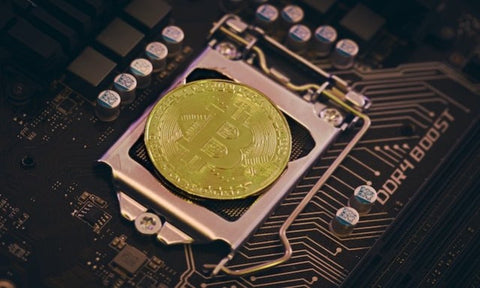
Source:cryptonews
While there are lots of beliefs that you need to have a huge, expensive setup to mine Bitcoin at home, that’s not entirely true.
While the odds are pretty slim to make money mining bitcoin as a small at-home miner, it provides an excellent way to learn more about bitcoin, and you never know, you could still end up finding a block and receiving that 6.25 BTC block reward.
In this guide, you will learn what Bitcoin mining is, how it works. and how you can mine at home.
What is Bitcoin Mining?
Bitcoin mining is the process through which Bitcoin transactions are processed, new blocks are added to the Bitcoin blockchain, and new units of Bitcoin are introduced into circulation.
Mining is a technical process that involves the use of computational power – commonly referred to as hash power – via specialized mining hardware to solve complex calculations. Bitcoin miners contribute extensive hash power and compete against each other to find the next block to win the block reward. The first miner to corroborate the next Bitcoin transaction block receives 6.26 BTC as a reward. The reward will reduce to 3.125 BTC by 2024 through a process known as the block reward halving. The halving process takes place every four years.
As a Bitcoin miner, you can opt to go at it alone or be part of a mining pool in order to earn rewards in Bitcoin.
How to Set Up A Bitcoin Mining Operation at Home
Now that we know what bitcoin mining is, let’s take a look at how to set up a bitcoin mining operation at home.
For starters, you will need to choose the hardware you want to use to mine bitcoin. While a desktop computer can technically be utilized to mine Bitcoin, it’s highly unlikely that it will earn you any BTC rewards. You will, therefore, need to invest in a hardware setup that is specifically designed for Bitcoin mining.
As a beginner, you don’t necessarily need to buy ‘new’ hardware. Instead, you can purchase already used hardware online to save money.
However, given how technical and complex mining can be – depending on your level of computing knowledge – it’s advisable to dedicate some time to learning about the fundamentals of mining to ensure you know how to run your specific setup correctly.
Factors such as cooling and electricity costs in your area will play important roles in your mining setup, for example.
Secondly, get yourself a Bitcoin wallet, in case you don’t already have one. This way, if you are able to successfully mine a Bitcoin block, you can get paid to your wallet. This can be a separate wallet from the one you use to carry out day-to-day transactions, and should ideally be non-custodial so that you have control over the bitcoin you receive.
Thirdly, now that you have your hardware and wallet, you will need to configure your mining software.
Depending on whether you want to do a solo mine or join a mining pool, you will need to look into the technicalities of each option and establish what works for you. This will also impact the software that you choose.
There’s loads of free bitcoin mining software you can download and use. Each mining software utilizes a specific operating system. For Bitcoin, there are multiple kinds of software that can be used, but some of them may impact your mining activities.
Last but not least, once the above steps are done, you will now be ready to mine Bitcoin. But before that, ensure you download Bitcoin’s local copy of the blockchain. Your miner will now be ready to mine Bitcoin 24/7 without much supervision from you.
Will You Make Money as an At-Home Miner?
By now, you must be wondering if you will be able to make any money if you start to mine bitcoin at home. Well, probably not.
But, there is a tiny chance you could end up finding a block as a solo miner. It has happened before.
For instance, back in January of this year, a solo miner who had a computing power of only 126 TH, was able to find a Bitcoin block and earned $266,870 in BTC as the reward.
A week later, another solo miner was able to successfully mine a block of Bitcoin with only a 116 TH hash rate and thus earning nearly $267,500 in BTC.
Yet again, barely ten days later, another solo miner using only 86 TH computing power was able to earn $215,000 in BTC for completing another Bitcoin block.
While all the three winners mentioned were able to mine bitcoin as single individuals on Solo CK Pool – a Bitcoin mining pool software project that helps those interested in mining to go at it solo instead of having to join a mining pool – it is still possible for one to mine bitcoin solo using whatever software works for you.
So, should you mine Bitcoin at home? It all boils down to your personal decision.
If you want to mine bitcoin because you think it will make you rich, you are probably betting off buying and holding bitcoin instead because, with a small mining setup at home, you will most likely struggle to make a profit (taking electricity and setup costs into account).
But if you want to learn more about bitcoin, digital currency mining, and the technology behind it, then mining can be an excellent way for a newcomer to interact with Bitcoin.





